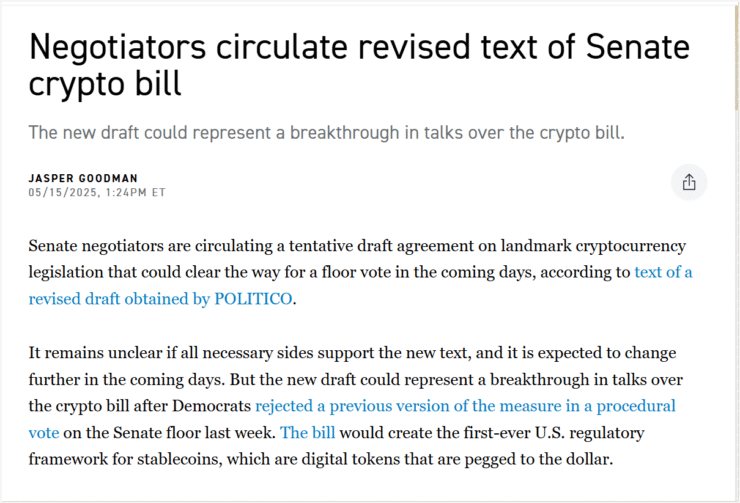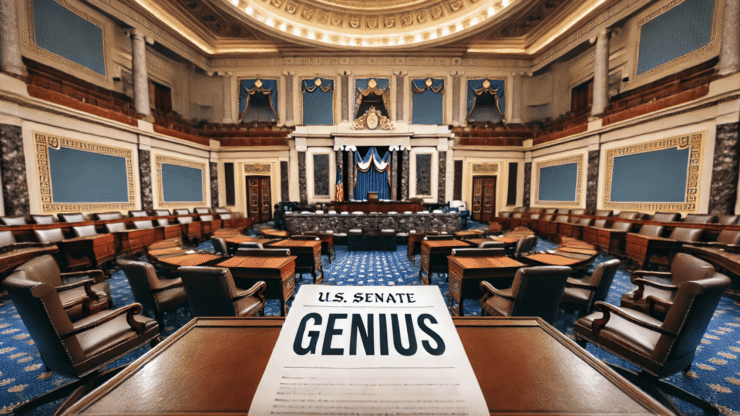After a week of heated negotiations and political brinkmanship, a new draft of the Senate’s GENIUS Act—a key piece of legislation aimed at regulating stablecoins—has been released and is now being positioned for a potential floor vote early next week. While the updated language is being hailed by some Democrats as a step forward, significant concerns remain about enforcement and political favoritism.
According to the draft, the revised bill includes new clauses aimed at strengthening national security provisions, tightening ethics rules, and clarifying restrictions on stablecoin issuance by large tech firms and foreign entities. These additions were presented as concessions to Democrats who had stalled the bill over unresolved concerns.
However, the most contentious point remains: the exemption granted to the president and vice president from a rule barring executive branch officials from issuing stablecoins. That carve-out has fueled bipartisan criticism, especially in light of former President Donald Trump’s direct ties to World Liberty Financial—a crypto venture run by his family that recently inked a $2 billion deal with the United Arab Emirates centered around its proprietary stablecoin.

While the new language bars executive special government employees, including high-profile tech figures like Elon Musk and AI adviser David Sacks, from issuing their own tokens, critics argue it doesn’t go far enough to ensure impartiality or prevent abuse at the highest levels of government.
Despite the unresolved issues, optimism is growing that the GENIUS Act could move forward—with the revised draft representing what some lawmakers see as the best compromise currently achievable in a sharply divided Senate. Whether that will be enough to bring skeptical lawmakers on board remains to be seen.
Stablecoin Legalization Nears, Big Tech Clause Sparks Debate
Stablecoins—digital tokens typically pegged to fiat currencies like the U.S. dollar—have become a key on-ramp for global crypto activity, enabling users to trade, send remittances, and move funds across borders without touching traditional banking rails. With legislation now inching closer to passage in the Senate, analysts anticipate that the formal legalization of U.S.-issued stablecoins could unlock an influx of institutional capital—potentially bringing hundreds of billions, if not trillions, into the crypto ecosystem.
The GENIUS Act, which aims to define a regulatory framework for stablecoin issuance, marks a major step in that direction. But as the bill gains momentum, one of its most debated provisions centers on the role of major technology companies like Apple, Meta, and Amazon—and whether they should be allowed to issue stablecoins or access sensitive transaction data for commercial gain.
In a first for the legislation, the new draft includes restrictions designed to curb Big Tech’s influence. It states that any public company not primarily engaged in financial services must obtain approval from an independent Stablecoin Certification Review Committee before launching a token. To qualify, the firm must prove that its stablecoin would not introduce systemic risk to the U.S. financial system and must agree not to use or sell users’ transaction data for targeted marketing—unless explicitly allowed through customer consent in terms of service agreements.
However, critics argue that this consent clause is a major loophole. Under the current language, Big Tech firms would still retain the legal right to harvest and monetize transaction data, provided they disclose their intentions in user agreements—a practice widely criticized for favoring corporate interests over consumer privacy.
Foreign Stablecoin Issuers Face Tighter U.S. Restrictions
One of the most politically sensitive issues in the ongoing stablecoin debate is how the U.S. government should treat foreign issuers—particularly Tether, the world’s largest stablecoin provider, headquartered in El Salvador. Lawmakers have long expressed concern over Tether’s alleged use in illicit finance, including money laundering and sanctions evasion.
Earlier drafts of the GENIUS Act offered a pathway for foreign-issued stablecoins to operate in the U.S., provided the issuing countries had regulatory regimes “comparable” to U.S. standards. That language has now been revised.
The latest draft of the GENIUS Act adds new safeguards, shifting more discretion to the U.S. Treasury Secretary, Scott Bessent. Under the revised provisions, foreign jurisdictions that wish to have their stablecoins offered within the U.S. must no longer be considered a “primary money laundering concern”—a formal designation also controlled by the Treasury. Additionally, these jurisdictions must maintain anti-money laundering, counter-terrorism financing, and sanctions compliance programs that meet the Secretary’s standards.
While the updated language is intended to address long-standing Democratic concerns, critics warn that the effectiveness of these provisions could vary depending on who holds the Treasury post. As a presidential appointee, the Secretary’s decisions could be influenced by shifting political priorities—particularly relevant given El Salvador’s diplomatic alignment with the Trump administration, which has ties to Tether through various crypto ventures.
Whether these updates are sufficient to win over skeptical Democrats remains uncertain. Key figures have reportedly requested additional time to review the full text before any vote is scheduled. Still, the circulation of the revised bill suggests that pro-crypto Democrats believe they’ve secured enough concessions to push for renewed momentum on the Senate floor.
Quick Facts
- A revised draft of the GENIUS Act has been released and may see a Senate floor vote next week, signaling renewed momentum for stablecoin legislation.
- The bill includes a controversial exemption for the president and vice president from rules barring executive officials from issuing stablecoins, sparking bipartisan concern.
- A new clause limits Big Tech from launching stablecoins without independent certification—but allows data monetization with user consent, which critics see as a loophole.
- Foreign issuers like Tether face tougher standards, requiring compliance with U.S. Treasury AML designations and approval from the Secretary before U.S. market entry.





